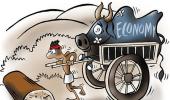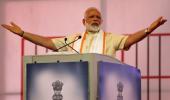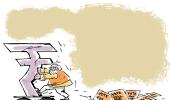‘Modi must pull off the economic equivalent of his Article 370 coup. No one thought it was possible. But Modi showed that it was.
‘This is what he must now do with the economy -- move the government out of the way in the same spirit as he moved Article 370 out of Kashmir’s way,’ says TCA Srinivasa Raghavan.

The pattern is truly extraordinary. All highly successful Indian prime ministers -- the two-term ones that is -- have got their politics absolutely right and their economics absolutely wrong.
Modi is no exception, as his various aggressive political initiatives show. The ruthless reduction of J&K to a Union territory is the latest in a long line of such initiatives.
The pattern was set by Jawaharlal Nehru. He was, in every way, a fantastic man who, even though his government didn’t have enough money to think big, always thought bigger than big and deeper than deep.
But, alas, he completely messed up India’s economy by insisting on an autarkic, capital-intensive investment model.
His daughter Indira Gandhi was exactly the same. She was a brilliant political leader and for a brief while made us all very proud. But like her daddy, she messed up the economy with her emphasis on public ownership of industrial and financial resources.
If Nehru had created the problem of wrong allocation of resources, Indira Gandhi worsened it.
P V Narasimha Rao tried to fix the allocation problem but only half-heartedly. He therefore fell between two stools and was not re-elected for a second term.
Then there was Manmohan Singh who also served two terms. But he failed to fix the Nehru-Indira allocation problem in which an increasing proportion of national resources always gets misallocated.
In 2014 along came Narendra Modi. Everyone thought he would direct resources where they would be used most efficiently. But he carried on with the Nehru-Indira policies and has disappointed everyone. He has, however, avoided the Narasimha Rao trap. He was handsomely re-elected in 2019.
The real structural problem
So in economic terms, India has remained completely unchanged since 1957. It therefore continues to waste national savings, which have always been inadequate.
Economists know this and love to talk about economic structures. However, each economist has his own interpretation of the term and there is no consensus on what constitutes a structural problem.
Being economists, they also deliberately miss the point that the real structural problem is not economic but political. This is because both the Constitution and the electoral system emphasise equity over efficiency.
This has resulted in every 10-year period of good growth being followed by a decade-and-a-half of wasting the fruits of that growth on distribution. This, if you ask me, is the real structural problem, not some intellectually attractive but practically useless economic hypothesis. Our political system acts as a major drag on the economy.
We are well and truly stuck. Or, to use Gunnar Myrdal’s famous 1967 description, India is a soft State. Later, Lee Kuan Yew said the same thing about India.
What Modi must do
So what can Modi do within these constitutional and political constraints? Indeed, can he do anything at all?
The technical solutions provided by economics are well known. But as all prime ministers have known, they are the least of their problems because the real opposition is political, and the most difficult ones of these are posed by members of the ruling party.
Nehru faced it and had to force the pace because his party was snapping at his heels. Indira Gandhi too was under attack by her party colleagues and changed the DOS of the Indian economy.
The same thing happened to Narasimha Rao and to Manmohan Singh. Both would have liked to make a clean break from the Nehru-Indira model but it was the Congress party that prevented it. It seems likely that Modi faces a similar problem -- if not from the BJP, certainly from the RSS.
After all, as we all know, it is always more difficult to convince your friends when they have old-fashioned views.
What I would suggest therefore is an economic chintan shivir where a genuine attempt is made by the government to educate its supporters.
This shivir should pass a resolution that reverses the Congress party’s Avadi resolution of 1955. It must hand the baton back to the private sector.
Or, if I may, Modi must pull off the economic equivalent of his Article 370 coup. No one thought it was possible. But Modi showed that it was.
This is what he must now do with the economy -- move the government out of the way in the same spirit as he moved Article 370 out of Kashmir’s way.











